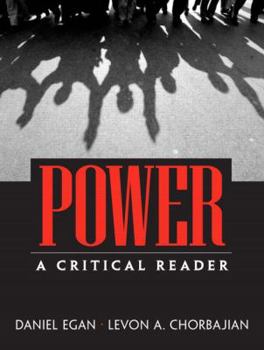Power: A Critical Reader
For courses in political sociology. Successfully bringing together accessible readings that cover the broad range of issues of importance to political sociologists. Readings address both classic... This description may be from another edition of this product.
Format:Paperback
Language:English
ISBN:013183438X
ISBN13:9780131834385
Release Date:October 2004
Publisher:Routledge
Length:432 Pages
Weight:1.45 lbs.
Dimensions:0.8" x 7.0" x 9.1"
Customer Reviews
1 rating
Excellent Reader
Published by Thriftbooks.com User , 17 years ago
I can think of no better overview of the concerns of critical political sociology in the United States than this reader. With introductory comments and selected readings Egan Chorbajian offer a comprehensive radical critique of power, politics and the state for political sociology students. Though their primary focus is on how these function in the United States, they also include much that is relevant to other countries. The forty readings from academics and others are grouped around seven themes: critical theories of power, state theory, electoral politics, the welfare state, media and ideology, globalization, war, genocide, and repression, revolution, and social movements. Among the authors are Frances Fox Piven and Richard A. Cloward, G. William Domhoff, Linda Gordon, Gøsta Esping-Andersen, Noam Chomsky, Mike Davis, and Jerry Lembcke. Much can be learned from the editors' introductory commentaries to these readings, which are exemplars of lucid prose. They start with an analysis of the meaning of power itself--"the central concept in political sociology." They endorse Steven Lukes's three dimensional view that power involves first, as was originally pointed out by Max Weber and then taken up by Robert Dahl, the ability to get one's will despite resistance; second, the ability to prevent inconvenient issues from emerging in the first places so that resistance will not have to be overcome; and, third, very importantly, the ability to structure the prevailing order so that ordinary people simply accept their powerless roles within it without protest. This third dimension leads them to Gramsci's concept of hegemony, which they define as "the cultural and intellectual dominance of the ruling class through a coherent system of values, beliefs, norms, and symbols that are supportive of the established order." The more successful upper class hegemony is, the more the powerless accept their roles by being convinced that the prevailing order is the most preferable or inevitable. The products of ruling class dominance are then inequality and injustice, but--as is the real point being made about power as it is experienced especially in the United States--inequalities and injustices that are often taken without protest by their victims. What legitimates the system is the belief that it is, after all, democratic. But, as the editors and contributors abundantly make clear, it is a loaded democracy structured so that the upper class can easily ward off potential threats to their interests. The state is the arena of lopsided struggles between upper and other classes. For the most part upper classes get their ways, though occasionally they concede some ground to opponents in the interests of maintaining legitimacy. The United States has seen, for example, the development of social programs that benefit middle, working, and lower classes, though less so than Europe. As a recurring issue, Egan and Chorbajian thr





